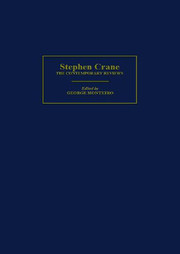Book contents
- Frontmatter
- Contents
- Series editor's preface
- Introduction
- Acknowledgments
- Maggie: A Girl of the Streets (1893)
- The Black Riders and Other Lines (1895)
- The Red Badge of Courage (1895)
- George's Mother (1896)
- Maggie: A Girl of the Streets (1896)
- The Little Regiment and Other Episodes of the American Civil War (1896)
- The Third Violet (1897)
- The Open Boat and Other Tales of Adventure (1898)
- Pictures of War (1898)
- War is Kind (1899)
- Active Service: A Novel (1899)
- The Monster and Other Stories (1899)
- Bowery Tales (1900)
- Whilomville Stories (1900)
- Wounds in the Rain: War Stories (1900)
- The Monster and Other Stories (1901)
- Great Battles of the World (1901)
- Last Words (1902)
- The O'Ruddy (1903)
- Index
- References
The Third Violet (1897)
Published online by Cambridge University Press: 06 July 2010
- Frontmatter
- Contents
- Series editor's preface
- Introduction
- Acknowledgments
- Maggie: A Girl of the Streets (1893)
- The Black Riders and Other Lines (1895)
- The Red Badge of Courage (1895)
- George's Mother (1896)
- Maggie: A Girl of the Streets (1896)
- The Little Regiment and Other Episodes of the American Civil War (1896)
- The Third Violet (1897)
- The Open Boat and Other Tales of Adventure (1898)
- Pictures of War (1898)
- War is Kind (1899)
- Active Service: A Novel (1899)
- The Monster and Other Stories (1899)
- Bowery Tales (1900)
- Whilomville Stories (1900)
- Wounds in the Rain: War Stories (1900)
- The Monster and Other Stories (1901)
- Great Battles of the World (1901)
- Last Words (1902)
- The O'Ruddy (1903)
- Index
- References
Summary
“Book Notices.” Bachelor of Arts 4 (May 1897), p. 511
The author of The Red Badge, The Little Regiment, and Maggie, in this summer story applies his heavy, realistic system to a light, silly love tale. His intense style, extraordinary use of English, and thundering adjectives are here out of place. The book is dull, and the flirtation a piece of idle vacuousness. The girl throws three violets, and is won at last in a hopeless sort of confusion—for the reader. “Oh, do go—go! Please! I want you to go!” This in Cranese is the girl's method of gently saying, “I love you.” Hawker, the crack-brained lover, says, “What?” to this, springs to his feet, and explodes with delight. Crane is out of his element; his conceits of style do not sound so well in light, trifling comedy.
Brooklyn Daily Eagle, May 16, 1897, p. 16
Stephen Crane's most recent story, “The Third Violet” (D. Appleton & Co.), should convince its author that a love story cannot be told in the matter of fact manner in which he would describe the episodes of a battlefield or the life of the streets and the tenements on the east side. Yet, this is just what Mr. Crane has attempted in this new novel. Apparently his idea was that a report of the conversations between a pair of lovers, an account of their actions, the inconsequent talk that flowed from the people about them, the things they did and what they said to other people or which other people said about them—all told just as it actually happened, would form an interesting compilation.
- Type
- Chapter
- Information
- Stephen CraneThe Contemporary Reviews, pp. 143 - 160Publisher: Cambridge University PressPrint publication year: 2009



